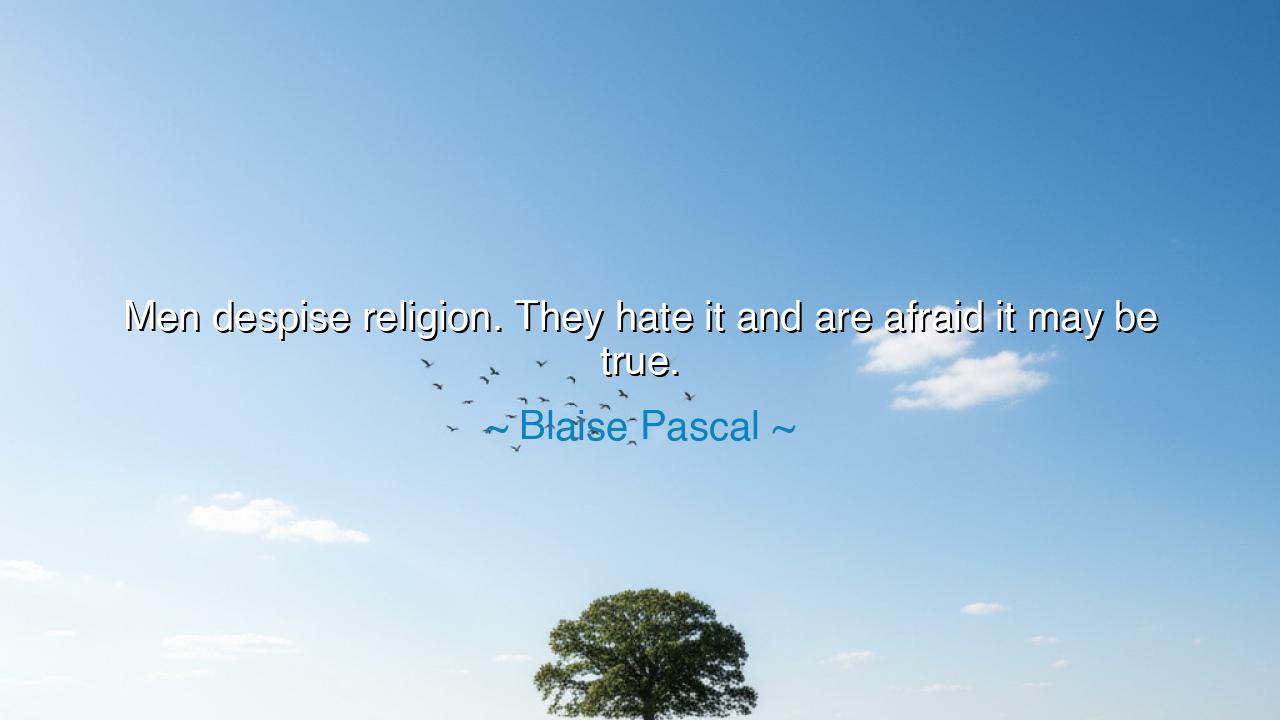
Men despise religion. They hate it and are afraid it may be true.






Hear now, O seekers of wisdom, the words of Blaise Pascal, a mind of great depth and insight: "Men despise religion. They hate it and are afraid it may be true." These words speak to the complex and often contradictory relationship humanity has with faith, spirituality, and the unknown. For while religion promises solace, meaning, and a connection to something greater than ourselves, it also brings with it a burden—an obligation to live in accordance with a higher law, one that transcends the desires of the self. Pascal’s words reveal the deep fear and resistance that many feel toward the truth of religion, not because it lacks meaning, but because it demands something profound from the soul.
In the ancient world, religion was seen as both a comfort and a burden. The ancient Greeks believed that the gods ruled over the heavens and the earth, but their pantheon was filled with capricious deities, whose whims shaped the destinies of men. Yet, there was a deep recognition of the power of the divine—an understanding that to live without acknowledging the gods was to live without meaning. The philosopher Socrates, sentenced to death for his beliefs, spoke of the divine calling that guided his actions, but he did not shy away from the suffering that this truth brought. The tension between faith and fear is evident in Socrates’ life—he knew that to truly understand life, one must confront the uncomfortable truths about the soul, morality, and the divine.
The fear of religion being true is not a modern phenomenon. Consider the ancient Romans, who lived in a world dominated by a variety of gods and belief systems. When Christianity began to spread, it challenged the traditional beliefs of the Roman Empire, which saw religion as something that could be molded to serve the state. The new faith, which demanded radical change of the heart and soul, was met with violent resistance. Emperor Nero and others persecuted Christians because they feared the truth of this new religion—it was not just the belief in a new god, but the call for transformation and accountability to a higher law, something that the rulers could not control. In this context, the fear and hatred that Pascal speaks of are clear—religion is not simply a matter of belief, but a call to live differently, and that call is often unwelcome by those who benefit from the status quo.
In more recent history, the rise of secularism and atheism in the modern world reflects this same fear and resistance to religion. Think of the towering figure of Karl Marx, who famously stated that religion was the "opium of the people," a tool used by the elite to pacify and control the masses. Marx’s critique of religion was rooted in his belief that the divine, as presented by the church, was used to distract the people from the realities of their suffering. Religion, in his view, offered false promises of salvation while masking the deeper issues of social inequality and human oppression. Here, we see not just the fear of religion being true, but the fear of what religion demands—change, self-sacrifice, and a rejection of personal desire in favor of a greater good.
Pascal’s insight into the human heart rings true even today. The idea that we might despise religion because it asks us to confront uncomfortable truths about our own mortality, responsibility, and purpose is one that transcends time. For many, the idea of a higher power—whether God or the divine force—creates an inner tension. To acknowledge the truth of religion means to recognize that we are accountable to something greater than our own desires, something that calls us to live with integrity, honor, and humility. And that is precisely what many fear: the freedom that comes from living in alignment with a higher truth is often more frightening than the comfort of living in ignorance or denial.
So, O seekers, what lesson can we draw from Pascal’s words? First, we must recognize that the fear of religion is not a simple matter of belief or disbelief—it is the fear of confronting the deeper, more difficult truths about our own nature. Religion challenges us not just to believe, but to live differently. It calls us to face our deepest fears, our mortality, and our imperfections, and to choose to live in a way that is aligned with a higher purpose. This is not an easy path, but it is the path of true freedom, the freedom to live authentically, to seek the truth, and to be accountable for our actions.
Thus, O seekers, let us take the courage to confront the truths that religion offers us, not with fear and resistance, but with a heart open to transformation. It is through this struggle that we grow in strength of character, in wisdom, and in peace. Religion does not enslave the soul; it liberates it, but only if we are willing to face the discomfort of truth. May we all find the courage to embrace the challenge, knowing that in doing so, we will find a deeper sense of meaning and purpose than anything the world can offer.






AAdministratorAdministrator
Welcome, honored guests. Please leave a comment, we will respond soon